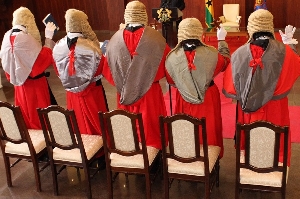– the questions are which and how
In the bad fearful days before August 29, when the spectre of a nation disintegrating in violence haunted our every waking and sleeping hour, our political leaders, suddenly stricken with fear talked about power-sharing. Now that we have crossed the bridge and landed safely on the dry land of peace, they appear to be dropping the thought. We should not allow them to forget that idea because power-sharing is not bad; indeed it is the very essence of democracy. The only question is how to do it.
Power-sharing is an often misinterpreted concept because the term can mean many different things to many different people in many different contexts and scenarios. But I think that to understand it as a force for good we must take it literally as the words stand, - as for example in sharing electric power among the entire nation. Then, two thoughts emerge; that it is fair to share power as equally as possible and that it is shared equally for a purpose. Power, whether electrical or political is not meant to be an end in itself; it is a means to an end.
This is not the first time the idea of power-sharing has emerged in a time of fear. During the awfully frightening days of the 2008 elections when the two political parties – the NDC and NPP – appeared ready to square off for real, some of us talked about power-sharing and in my opinion, the close election result confirmed that the Ghanaian people would want the two major parties, and all political parties to cooperate rather than drift apart in rancour and bitterness, as Kutu Acheampong used to say. Of course, the other, more popular interpretation is that the election result says that the party that got the majority should “take ALL the power”. Let us think again and start by looking at few ideas about power-sharing.
Let us begin with the current practice where the winner of the election takes all the power. As the last two elections have shown, the electorate is divided almost right down the middle so it is fair to say that one half of the political population is excluded from power when their 50 percent party is not in power. The Constitution gives the President power to appoint thousands of people to various positions either as an exclusive right or in consultation with various institutions. Parliamentary vetting means the minority in power can interrogate the President’s choice of personnel for some offices, but with the way Parliament works, and by convention most appointees go through vetting unscathed. Nowhere, unless I am mistaken, is the express consent or even opinion of the minority mandated by the Constitution for any executive appointments.
But power-sharing does not have to apply only to political parties. The concept has to be interpreted liberally if it is to make sense as a positive force. Take this example. Males and females are nearly equal in numbers in this country but in most social situations there are more women than men. However women make up only ten percent of members of parliament and an equally paltry proportion in the executive branch. The international average of women in politics is 20 percent so at ten percent Ghana is far below that average. However, such exclusion of women means that another fifty percent of the population is almost excluded from power. This means that only the male half of one half of the country is included in the mainstream power structures in our country. How can we hope to succeed when we are drawing on such a narrow band of talent and experiences for nation building?
That is not all. Think of power-sharing in another way. Fact: not everyone chooses to be a politician and the country’s talent pool includes people from all walks of life and professions. However, appointments to positions in public institutions are made from the political gene pool which is necessarily limited and restrictive for reasons that must be obvious. Politicians are no smatter or dafter than the rest of us, which is why it is wrong to treat each and every politician in a party the moment it takes power as an omniscient being. Politicians have been appointed to public boards when they have no demonstrable above average abilities or experiences for that particular office apart from being politicians.
Thus, another form of power-sharing is to widen the group or groups from which public office and personnel are extracted. This is not the case today. Politicians who have failed at elections are often appointed to public office as district chief executives in the same constituency/district at which they were rejected by the electorate. This creates the impression that the only people who matter in the political stakes are politicians when it is obvious that if we want to succeed we must look beyond politicians in order to develop effectively as a nation.
The point is power-sharing does not only mean some kind of arrangement by which politicians divvy up the power among themselves. However, there are times such as now when the election results clearly call for a formal sharing of power. As a long-time believer in proportional representation and parliamentary form of government, I see the recent pronouncements against the winner-takes-all system as endorsements of the call to re-examine our electoral system which is long overdue. Proportional representation is the only electoral system that would make every vote count equally in the selection of our representatives to parliament.
As things stand now, if you vote for a particular party in some parts of the country in the parliamentary election that vote counts for nothing. The winner-takes-all means that people who do not even win a majority can and often get to represent their constituencies on a minority vote because they got “first past the post”. Most democracies in the world use some form of proportional representation because it delivers real democracy based on the accurate proportions of votes garnered by political parties. It encourages supporters of smaller parties to vote because their total votes could get them seats in parliament.
Obviously some power-sharing strategies need constitutional amendments but other all-inclusive policies demand only administrative arrangements, including affirmative action plans and political will. However, the most important demand for power-sharing is a change in the mind-set that governs politics and the exercise of power. At the moment, despite the high-sounding platitudes offered by politicians, the game is about personal gain for most people who choose to play it and their expectation is for some kind of personal reward in return for their loyalty to the party machine. This means politicians put a premium on loyalty to their party at the expense of the nation in order to win favours from the leadership. We cannot decree personal interests out of politics but a more inclusive kind of politics will bring in other values beside the obvious ones of misplaced loyalty, greed and self-aggrandisements which inevitably lead to nepotism and corruption.
For example, research around the capabilities approach theory in political economy shows that women bring specific skills and insights into politics which are missing when they are excluded. The same can be said of different professional and technical skills which are needed at the centre, not the periphery of politics.
Fear may have propelled our politicians to talk up power-sharing but citizens must assess the idea not out of anxiety but as a model or models for developing a more inclusive and tolerant form of government.
kgapenteng@gmail.com
kgapenteng.blogspot.com
Opinions of Tuesday, 8 October 2013
Columnist: Gyan-Apenteng, Kwasi














